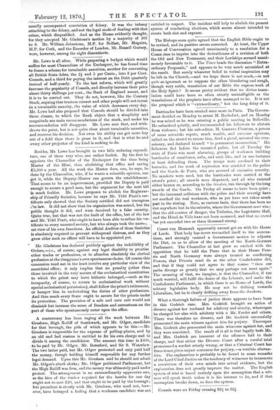Besides, Mr. Lowe has brought in two bills reducing expendi-
ture, one of them very wise, one rather foolish. By the first he appoints the Chancellor of the Exchequer for the time being Master of the Mint, thus abolishing that office and saving £3,500 a year. All the work the Master does, can, he says, be done by the Chancellor, who, if he wants a scientific opinion, can get it, while the Deputy-Master can govern the establishment. That seems to be an improvement, provided the Deputy is paid enough to secure a good man, but the argument for the next bill is much feebler. Mr. Lowe proposes to abolish the Registrar- ship of Friendly Societies, because he says Mr. Tidd Pratt's cer- tificate only showed that the Society certified did not transgress law. It did not show that its organization was sound, but the public thought it did, and were deceived by a false security. Quite true, but that was not the fault of the office, but of the law and Mr. Tidd Pratt, who ought to have been able to refuse his er- tificate to every unsound society, but who always took the nano.. est view of his own functions. An official Auditor of these Societies is absolutely required to prevent widespread distress, and as they grow older such an officer will have to be appointed yet.


































 Previous page
Previous page